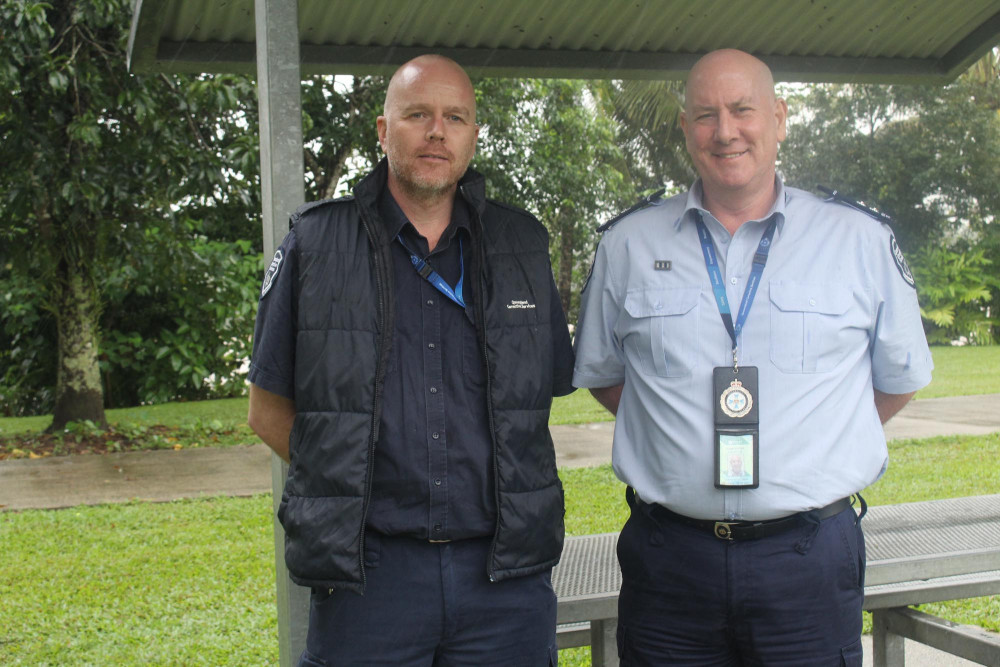General News
11 July, 2022
Offenders Give back
OFFENDERS from the Lotus Glen Correctional Centre near Mareeba are performing vital work for the Innisfail community and learning essential life skills that will benefit them when they are released.

As part of the Queensland Corrective Services (QCS) community service program, a selected group of low-custody offenders are now part of an Innisfail work camp, where they carry out community work for the Cassowary Coast Council such as maintenance of fences, cemeteries, heritage sites, playgrounds and the showground.
The initiative allows offenders to acquire employment and vocational skills and prepare for life after prison while saving council thousands of dollars to maintain the community facilities.
Acting manager of the low-custody facility at Lotus Glen, Robert, said the purpose of the work camp was to enable offenders to work and prevent them from returning to crime in the future.
“The work camp at Innisfail is part of the Lotus Glen low-custody facility up on the Tablelands,” Robert said.
“We have 12 offenders that live in Innisfail – they’re all employed, and the majority work for the council.
“One of our main aims is to try and give back to the community, so these guys are out there working, landscaping and whatever council needs them to do, our guys will help them.
“The biggest thing for us is to provide life skills for these fellas – life skills that are transferrable so when they’re out of prison, they have an opportunity to get employment and that addresses recidivism the right way.”
Not all offenders can be a part of the work camp. A combination of good behaviour and time in custody plays a role in who gets chosen to be a part of the community service programs.
“We screen the offenders heavily,” Robert said.
“We have the right people here with the right attitudes.
“There are quite a few procedures we go through regarding the offender’s crime, the time they’re in custody and their general behaviour.
“It’s a pretty trusted position to be in down here, and we need to give them a little bit of autonomy, but they need to return the favour, so they need to be doing the right thing.”
Two work camp supervisors are living in Innisfail to ensure the security and safety of both inmates and the community. They supervise the inmates and make sure that everything runs smoothly in the facility.
“There is supervision, but it’s on the offenders to do the right thing,” Robert said.
“If they choose not to, they’ll be sent back to prison on the Tablelands.”
Acting field supervisor Shane said the camp had a very positive impact on the inmates.
“This is a role I had been chasing for a while,” he said.
“It’s a very different atmosphere to the prison, and it’s very positive to see the prisoners I’ve known from the main centre when they get down here – I get to see how much they’ve progressed.
“It’s a very positive environment; the offenders are here because they want to be here, and that makes a tremendous difference.
“They enjoy the camp, working within the community and their work ethic is very high.”
As the person who is with the offenders every day, Shane said the camp not only prepared them for employment but also humanised and dignified them, resulting in an easier reintegration into society.
“The offenders that work with council tell me they are treated just like other employees,” he said.
“They get a lot of credit for what they do, and some of them are great workers, and I think it’s the mutual respect they get when they’re working that makes a difference for them.”
The work camps and community service programs are a state-wide initiative that, during 2020-21, resulted in a total of 126,239 hours of community service by supervised offenders, equating to more than $4.4 million in unpaid work for communities across Queensland.


